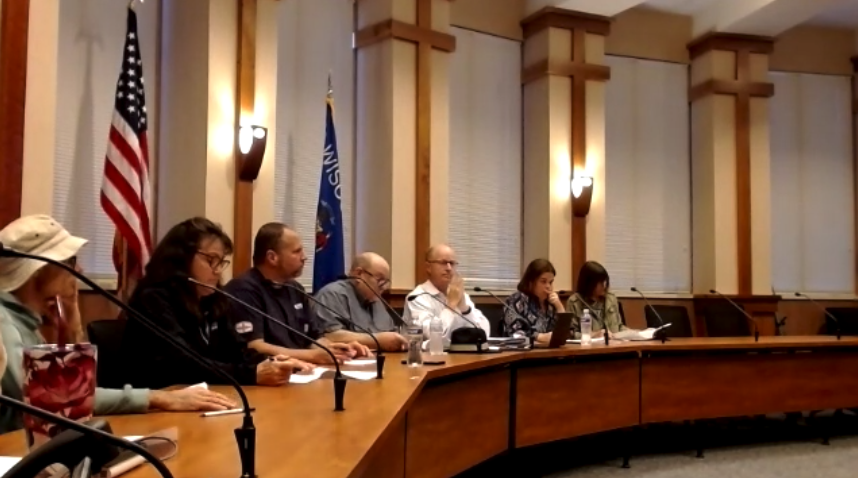City, district consider first draft of six-year aquatic center contract; language changes discussed
- Home
- City, district consider first draft of six-year aquatic center contract; language changes discussed

City, district consider first draft of six-year aquatic center contract; language changes discussed
By Kim McDarison
Members of the Whitewater Common Council and the Whitewater Unified School District Board of Education on Monday examined a 21-page draft of a six-year Whitewater Aquatic and Fitness Center lease and operational agreement between the two entities.
Once signed by both parties, the agreement is slated to take effect in 2024.
Those in attendance Monday parsed through the document on a page-by-page basis, with members of both boards offering comments, concerns and language changes.
Whitewater City Manager John Weidl said the document provided within the packet for the joint meeting was drafted by legal firm von Briesen and Roper, following a request from the city.
To create the document, he said, the city supplied the firm with a previous aquatic center lease and operating contract, and motions which had been previously approved by the two governing bodies of the aquatic center — the common council and the school board —along with copies of meeting minutes.
Both entities approved motions outlining operational and capital contributions over the six-year period during separate meetings held in August.
In advance of Monday’s discussion, Whitewater Unified School District Board of Education President Larry Kachel said the document supplied by the city through its attorney had not yet been reviewed by the district’s attorney.
Also during the meeting, a motion to change language in the document allowing for school board approval of members appointed to a new board titled: Aquatic Center Committee (ACC) was approved by a vote of 5-1 by the city council, with councilwoman Jill Gerber casting the ‘no’ vote. Council member Lukas Schreiber was not in attendance.
Kachel said that the board would not participate in motions during the meeting, but would instead bring language changes back to its full board during its next regularly scheduled meeting for discussion.
Along with Kachel, School board members in attendance Monday, included Stephanie Hicks, Lisa Huempfner, and Miguel Aranda who joined the meeting virtually. Absent from the meeting were board members Jennifer Kienbaum, Maryann Zimmerman, and Christy Linse.
Information provided through a board packet by the school district noted that the board was prepared to “further negotiate,” several items, and advanced the following statements:
• Maintenance of the lap and leisure pool, including pool chemistry, will be managed by the city of Whitewater.
• Maintenance of the parking lot, including snow removal during school hours will be managed by the district.
• Capital contributions will be housed in segregated accounts and not co-mingled with operational funds.
• Capital improvements/maintenance costs will be shared by both entities 50/50.
• A Capital Replacement Schedule, which was provided within the document, will be attached to the contract.
• “Further negotiations to (be) completed by attorney.”
Meeting discussion
Opening discussion, Whitewater Common Council President Jim Allen thanked those in attendance for “continuing to show up at these meetings,” calling the work before the two boards “arduous.”
“We are close,” he said, “down to the nitty details now between attorneys,” he added.
“Hopefully we can come to a very good resolution tonight,” he noted.
Weidl said the document under discussion contained the “correct numbers,” as previously agreed upon by both entities, but also “has a lot of stuff left over” from an earlier agreement made by the two bodies.
He encouraged members of both bodies to make comments and changes as they saw appropriate.
Kachel cited language within the document that used ACC as a substitute for the aquatic center’s oversight committee, which remains, until a new contract is approved, the city’s Park and Recreation Board.
“That works some of the time; not all of the time. Our intent with that committee is not to — because it does have no staff, it’s got no employees, it will be volunteers only … they are there to provide help, advice, we want people … that have backgrounds in running facilities like that, to help the fundraising, the day-to-day, and I think the way that it’s written — and now, again, it’s just first draft, it’s not a big deal — but I think they’ve got a little too much liability and responsibility to make it attractive to a committee, because the city, all employees are still going to be city staff, you’re still running the operations, so, again, it’s just something as we go through it,” Kachel said.
Aquatic Center Committee selection process
Discussion regarding a portion of the contract outlining the composition of the ACC centered around “Part E” of the document on Page 4.
Kachel, citing the portion of the contract, said that the district was hopeful that it would “have input” when deciding who three citizen members sitting on the five-member board would be. The group was in agreement that each entity — the city and the district — would have one members of its body serving on the committee.
“It’s kind of a different kind of board; it’s not truly like Parks and Rec where they do ultimately answer to the city. So just in the wording in E, I’d like it to be shown that the two boards will come to an agreement on who those three members are. We have … no issues if you want to have more than one member from each of our two entities, but only one vote,” Kachel said.
Describing the school board’s vision of the ACC, he said: “The main thing was to have the three members be a majority without the city and school board.”
Councilman Neil Hicks questioned whether the deciding majority of the ACC should be composed of citizen members and not elected officials, whom, he described as “constituent facing.”
Kachel said citizens are taxpayers, adding: “It’s their money. We don’t have any money.”
Offering clarification, Weidl said: “I think what Larry is specifically asking for is that we don’t use the city’s procedure, which is an appointment made in conjunction between the manager and council president, approved by the common council. So I do hear that.”
He asked Kachel: “So then it would require any citizen appointment, what you’re asking us, to be approved by both governing bodies?”
“I think so,” Kachel said.
Councilwoman Lisa Dawsey-Smith suggested the group amend language within the document to include the words: “pending approval by the school board,” relative to a selection process regarding ACC appointments.
Councilwoman Jill Gerber offered concern, suggesting that inclusion of school board approval of appointments might slow the process down.
“I would prefer not to have it go to both boards. I just think that the timing between to set up these meetings, between when we meet and you meet, and to get these approvals for the board, is going to be, I think, excessively long,” Gerber said.
Kachel cited differences in the frequency with which the two bodies meet, noting that the city meets twice a month, while the district meets once.
“The approvals are a one-time deal. Once we have the board up and running it’s not like it’s every month,” he said.
Gerber proposed allowing the two members of the ACC who were representatives of the district and city council to pick the three citizen members, further proposing that the city manager serve as “tiebreaker” if there was a dispute.
“I would just rather give it to the two representatives then. I just think it’s going to be really long to go through both councils,” Gerber said.
Dawsey-Smith said that while the process of gaining approvals from both governing bodies might take longer, it also was “consistent with our ordinances.”
Members of both bodies acknowledged that the city manager indicated during the meeting that he did not want to take on a tie-breaking role.
“He’s shaking his head ‘no’” Kachel said.
Said Dawsey-Smith: “Let’s just say that the member of the common council is from a very specific aldermanic district, that one district and the people who elected it, would have the say for controlling who’s on the committee, potentially, not the rest of the taxpayers, versus allowing the full council to help make that decision.”
She added that by allowing both boards to approve each ACC appointee, all the taxpayers are represented.
Board of Education member Lisa Huempfner asked if there would be a process through which citizens could apply for an ACC appointment.
Gerber said that the city posts all of its committee openings.
“This would just be no different,” she said.
Councilman David Stone moved to have language including: “pending approval of school board,” to the document.
The motion was voted upon and approved by the city council.
Weidl asked the district if they would make a corresponding motion, asking: “How do we know you’re good?”
Kachel said the board’s next meeting would be held Monday, Sept. 25. The board would discuss the language change at that time.
Allen asked Kachel: “What’s your take on that motion though?”
Kachel responding, saying: “Both sides need to have involvement in it. I have no problem with each of the two members picking the three because they’re going to be working on behalf of their board. I’m not that concerned about the words right now. Let’s leave that to the lawyers.”
Aquatic Center Board responsibilities
Discussion next centered around the responsibilities of the ACC as outlined in the document.
Kachel, reading from the document, said the committee “shall have primary responsibility for oversight of the leased premises.”
He added: “It was never our (school board’s) intent for that board (ACC) to be all knowing, all, you know, decision … because it’s the city that is running the day-to-day with city employees.”
Said Weidl: “Let me share my intent and maybe you guys can either strike it or wordsmith it.”
He said the wording in the draft document was taken from a previously agreed upon document between the two entities, the school board and the city council.
“It says the city and the Whitewater Park and Recreation Board shall have primary responsibility for the management and operation of leased premises. So that was the original document that was signed, well, one of the documents signed by both. We worked to soften that from the management of the premises to having the primary responsibility for committee oversight, so where we tried to take it was in a direction that had the same level of committee oversight as other city committees,” Weidl said, adding that the intent was to show that the ACC would have committee-level oversight.
He described the structure as “consistent with our other committees,” adding that other committees of the council do not hire or fire employees, or have budgetary responsibilities, but instead, he said, “they introduce projects; they make recommendations.”
Dawsey-Smith asked Kachel if he might have a better “comfort level” if the information was presented in the form of an ordinance.
She described an ordinance as providing “the framework for that exact level of expectation for that committee.”
Kachel said the board would need more information.
Weidl asked Kachel to “use a couple of words to describe the type of oversight you see this committee having?”
Said Kachel: “Advisory; involved in assisting in ideas, the day-to-day marketing, fundraising, not all inclusive … because the city, you’re going to be involved in the operation with your employees. And so it’s partly for your benefit, too. If this group goes off on a tangent, and it just can’t be done.”
Waiving of fees
Citing language within the document, Kachel talked about fees and special events.
Said Kachel: “We held an event there (at the aquatic center) this year where we brought in, I think it was about 300 homeless kids. The idea was to teach them how to swim. And obviously it benefits the kids in the school district, but the benefit went way beyond that. And I think we paid for all that at a discounted rate. Something like that … (by agreement of both parties) is something we should just do as a community. It would be different if we were going to have a swim party for all the principals only, or something like that, but something like this that benefits the entire community. And I think it kind of keeps in line the relationship we have between the city and the school district … you know the school district allows the city to use those fields and gyms at no cost.”
Said Weidl: “So I’m hearing you say you want something added to this section; the consent of both governing bodies that the fee could be waived?”
Kachel said that was correct.
Capital budget items
Members sought to determine which items should be considered capital budget expenditures.
Weidl pointed to an attachment which listed all the capital expenditure items as identified by the city.
Said Kachel: “We definitely want the segregated funds when it comes to the capital improvement fund: your $100 (thousand) our $100 (thousand). How we do it; does it need to be in the same spot? No. Does it need to be segregated and that money can’t come out of there without both sides agreeing to it, that’s where we come into what if one of the sides — we have a disagreement. And the tiebreaker goes to … ?”
Said Weidl: “I’m not sure. I can tell you if the Public Works Committee recommends rebuilding the road, that goes to the city council. The council either accepts or rejects that recommendation. We used the same format here.”
Board of Education member Stephanie Hicks cited confusion that might arise as both boards, with a total of 14 members, worked to form consensus.
She asked: “If half of that money is coming from us (school district), all seven of us (school board) would have to agree; all seven of you guys (city council) would have to agree. We’re saying what happens if our side did not unanimously vote ‘yes’ and you guys did, how would we take the money and come up with that?”
“The motion dies like any other tiebreaker in any other public meeting. The funds do not get spent,” Weidl said.
Members of both entities considered making the Aquatic Center Committee the entity that would be responsible for breaking ties involving capital expenditures.
During the meeting, resident Chuck Mills came to the podium.
He said the constituents pay a fee to use the center and should therefore have a say. He proposed allowing the constituents who pay for a pass to be the tiebreakers.
“Once again, I’ll reiterate myself, it’s our pool and, as far as I’m concerned, the school is a guest in our pool for a fee. I believe that we should be the governing body. And a lot of this is just little petty arguments. Let’s get this done,” Mills said.
Neil Hicks cited language within the document which described maintaining walls, foundations and exterior structures of the aquatic center.
He said he believed the language made the ACC and the city responsible for some of those expenditures.
“This is the school district’s building,” he said, “… this is not our building; I don’t think we should have, or the ACC should have, any —maybe in an advisory capacity — advise, ‘hey, maybe we’d like to change the look of this or that,’ but why are we maintaining or repairing or replacing any of the walls, foundations or exterior structure?” he asked.
Weidl said the language was copied from the previous contract.
He said anything that is part of the building itself, in his opinion, is the responsibility of the school district.
“The list will become longer or shorter or both,” said Kachel.
He added: “On a normal lease, if we have a building, we’re renting it out, and we, as the owner of the building — the key there is renting it out, and there’s no rent being charged here. Again, that’s left over language … to me, that would be capital improvements.”
Neil Hicks proposed that language become incorporated into the document that defined capital expenditures by cost.
“I’d like to reword that to say that that capital list could also include $500,000 expenditures or more, or something. If you got to replace a wall or jack up a wall, there’s a cost to that. It may not be on the list, but if we run into something that’s going to cost us, I don’t know what the number is, a quarter million, $300,000, $500,000, that could become a capital expenditure,” he said, asking: “Not being our building, why would we, the city or the ACC, either one, want to make an alteration or addition structurally?”
Neil Hicks said he saw an addition as the type of project that would require that the ACC make a recommendation to the boards, and not part of a discussion about capital improvements.
Kachel said he believed the ACC’s role in making those recommendations “will depend on what the status of the ACC is going to be. We are using the terms. ACC was just plugged in wherever it said Park and Rec Board, and we don’t think that was originally the intent. You got to start somewhere,” he added.
Weidl asked: “Who are you guys proposing takes the lead on this then? Because every time the ACC is in charge of something you’re either delegating that to staff or physically another body will have to take that on. So that’s what this committee needs to decide.
“In the city, every instance, these recommendations run through — we run on a committee structure. It’s literally our best idea. We’ve tried to come in with something that we thought was our second best. Just help us out. that means tell us who’s supposed to affect the capital improvement plan, tell us who is supposed to be making sure that this stuff gets done?
“Are you guys suggesting the city manager do all this? The Park and Rec director do all of this? That the interim Park and Rec director do all of this?”
Said Huempfner: “I think, John, when I speak of it, it’s mostly that when, through our negotiations, we’ve always tried to make clear that like capital is part of the school buildings’ structure, and for that reason, to give this whole responsibility to the ACC to do this when it’s something that we own, the school district owns, there needs to be some type of consideration for the fact that it’s owned …”
Weidl responded, saying: “I hear you. Our lawyer is going to say when the air conditioning goes down, we shouldn’t be asking you guys for permission to go fix the air conditioner.”
Said Huempfner: “And I think we’re looking at walls and roofs.”
Said Stephanie Hicks: “And that’s why I’m wondering if more of that tiebreaker comes when it exceeds a certain amount.”
Snow removal
Kachel next cited a clause within the document about snow removal from the center’s parking lot.
“Let’s say we are at Christmas break. So we’re not in session. We would not normally be up there plowing during that week. We would plow at the end of it, just before school starts again. So our intent is to normally do plowing, but in a time when we are normally during school operation,” Kachel said, adding that the district did not intend to plow the aquatic center parking lot on days when the district was not open.
Weidl said the contract said otherwise.
He understood the district would plow the facility’s parking lot “like any other landlord would.”
Said Kachel: “Again, a landlord who’s receiving $1.”
Addressing Kachel, Allen said: “It’s going to be awful hard for the city to coordinate that. I’m sure you’ve got people on staff there even though school’s out.”
Stephanie Hicks said the district did not have people on staff to respond to plowing when the district’s buildings are closed.
“There really isn’t anybody allotted to those buildings during those shutdown times. That is definitely something we will have to agree on in one way, shape or form,” Stephanie Hicks said.
Gerber expressed confusion, noting that she was aware that other school districts in the area plow parking lots associated with school facilities when classes are not in session to allow clubs and sports teams to meet and practice.
Weidl noted that the city staff has other plowing obligations than school district parking lots.
“The city has the streets and the other stuff to do, respectfully. We’ve got other priorities,” he said, adding that as the agreement is written, the district would be responsible for plowing the aquatic center parking lot, which, he said, has been the district’s obligation “for the last seven years.”
“Has this been a problem in the past?” Gerber asked.
“It hasn’t been open 24 hours,” Kachel said.
“What does that mean on the weekend?” Weidl asked.
Said Stephanie Hicks: “I think it’s just something we need to take back because obviously that affects the contract. And that affects time, and our pay (for city staff), and how many days they obviously are contracted out. I think our lawyer is going to have to look at that piece, and then obviously our district has to look at that piece, because they (staff) are under certain contracted hours.
“It actually snowballs into lots of other things that we would have to address.”
Whitewater resident Mike Smith, addressing the joint panel, said: “I have two comment with regard to this. The first one is: it seems like, it seems like from my experience is that, particularly in high school, and even the middle school, has been open on the weekends for stuff … My second point is, I mean what are we talking about here? I mean how many times is it going to have to get plowed on Friday night, and then again on Sunday night? Two, three times a year? It just seems, respectfully, it just seems petty.”
Gerber asked: What if someone fell when a parking lot remained unplowed? Who’s liability is that?
Provisions for permanent closure
Citing a clause in the document about membership reimbursements, Kachel said he believed the clause no longer applied to the district since, with the start of the new contract, the district would no longer have any obligation regarding operational expenses associated with the aquatic center.
The clause described responsibilities associated with refunding prorated membership fees would the facility close.
Weidl said the clause referred to a permanent shutdown of the facility.
“This isn’t like we just decide to refund memberships. This is in the event of a total lack of funding and termination of the aquatic center,” he said.
In that case, he noted, the idea would be to dissolve the service and split the obligation to refund any portion of memberships using a 50/50 split between the two entities.
Kachel said the district would draft some language.
“In reality, if the city were to pull out of it, I can’t see why we (district) wouldn’t continue to run the lap pool. So, no, it wouldn’t be 50/50,” Kachel said.
Deficit payments
Kachel next revisited the topic of deficit operational payments, which, he said, was discussed at the last joint meeting.
After meeting with Jeremiah Thomas, an accountant with the city of Whitewater, Kachel said he had a better understanding of deficit payments which the district intended to pay.
Confusion stemmed, he said, after the district was made aware of a deficit payment due the city of $133,000.
The figure did not include an additional deficit amount accrued between July of 2021 and December of 2022 of $35,000, as described in August by Thomas.
“Do we have any idea what the monthly operational deficit is running from now until we sign this (contract)?” Kachel asked.
Weidl said he would find out.
Kachel said he thought the district was “pretty close” to “having everything covered.”
As reported earlier by WhitewaterWise, Thomas, in a followup interview, following the joint meeting held in August, noted that a $35,000 figure represented a deficit payment covering a period between July 1, 2021 and Dec. 31, 2022. He said an invoice was sent to the district in April with the amount and the period of time it covered.
In addition to that invoice, Thomas said that the amount required by the district to pay down the deficit through July 2023 was $133,868.
Thomas said he had met in August, following the meeting, with Kachel and Whitewater Unified School District Finance and Business Director Ben Prather to explain the full costs associated with the deficit, including the projected amount through to the end of the 2023 contract, which, he said, completes in December.
In August, he said, a full amount owed by the district to bring it to a zero balance regarding the historical and ongoing deficit is $221,938. The number includes a projected and estimated deficit figure of $88,070, which, he said, represents a period between Aug. 1 and Dec. 31 of 2023.
A story about the August joint meeting is here: https://whitewaterwise.com/city-approves-aquatic-center-proposed-lease-operational-agreement-school-district-to-vote-on-monday/.
An earlier story about the Whitewater Unified School District’s regular August meeting, at which time the board voted in favor of expenditures associated with a six-year operational and lease agreement beginning, once signed, in 2024, is here: https://whitewaterwise.com/school-board-approves-whitewater-aquatic-center-lease-and-operational-agreement/.
Next joint meeting
The next joint meeting of the city council and school board to discuss the Whitewater Aquatic and Fitness Center lease and operational agreement will be held Wednesday, Oct. 11, and is tentatively scheduled for 6 p.m. The entities agreed that they would be flexible with a location, with a possibility of meeting in the council chambers at the city’s municipal building, depending upon how late municipal court, which makes use of the council chamber on Wednesdays, runs. An alternate location has been identified as the Cravath Lakefront Community Building.

Members of the Whitewater Common Council and the Whitewater Unified School District Board of Education meet Monday at the Whitewater Municipal Building to discuss a draft of the Whitewater Aquatic and Fitness Center lease and operational agreement. Screen shot photo.
This post has already been read 1578 times!
Kim
Our Advertisers
Most Read Posts
- Commentary: Scott Johnson announces priorities

- UW-Whitewater student, alleged to have murdered fellow UW student, to appear for arraignment hearing Nov. 8

- Our Take: Of campaigns, accusations, and letters to the editor

- Discover Whitewater Series holds banquet; distributes funds to area nonprofits

- Happy Halloween from WhitewaterWise and Fort Atkinson Online

- Whitewater Arts Alliance: Meat raffle fundraiser rescheduled

- Trump assessed by ‘those who have seen him up close’

- Listen to American healthcare workers who served in Gaza

- ‘Why should I go to that cemetery?’

- ‘lies will come back to bite us’

Categories
- Advertisers
- Area events
- Art, culture
- Business
- Community
- County
- Crime, court
- Culture
- Diseases
- Economics
- Food
- Government
- International
- Law and Court
- Lifestyle
- Obituaries
- Opinion
- Police, fire, EMS
- Religion
- School
- Science
- Technology
- Today's features
- Today's news
- Top Stories
- Travel
- Uncategorized
- University
- World











